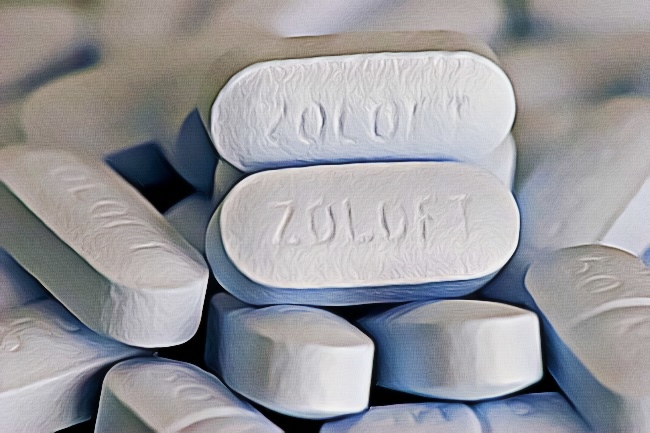What is Zoloft?
Zoloft is an antidepressant that also works as a selective serotonin reuptake inhibitor (SSRI). It is the brand name for the medication sertraline, which is only available with a prescription. Zoloft is frequently advertised as a safer alternative to related medications like Prozac for treating depression, OCD, PTSD, premenstrual dysphoric disorder (PMDD), social anxiety disorder, and panic disorder.
Zoloft works by reducing serotonin reabsorption in the brain, allowing more serotonin to be accessible for mood modulation. Although it helps treat severe depressive disorders, it is also accompanied by a black box warning that it may increase suicidal thoughts and actions in children, adolescents, and young adults who use it.
It is available in tablet form in doses of 25 mg, 50 mg, and 100 mg. It is meant to be taken once a day. Even though it is not classed as an addictive medication, Zoloft and other comparable antidepressants are often abused and can be psychologically addicting.
Is Zoloft Addictive?
Zoloft, like other selective serotonin reuptake inhibitors, is regarded as medically non-addictive; nonetheless, a psychological addiction can develop with sustained usage. This addiction usually develops when a person starts abusing the medication, either by smashing the pills and inhaling or snorting them or ingesting numerous tablets at once. Many people who are addicted to the drug will take extremely high amounts to feel “high.”
Though there is no specific evidence that Zoloft usage results in a high for the individual taking it, there is also no evidence to prove it otherwise. Some people claim that inhaling, snorting, and ingesting massive doses of the substance results in no feeling at all or even an unpleasant or uncomfortable experience.
Misuse of sertraline, like many other addictions, may lead to the use of other illegal drugs, such as methamphetamines, prescription opioids, and alcohol.
It is crucial to highlight that a substance’s high potential for abuse does not predict whether or not a person would develop an addiction to that drug. Like Zoloft and other selective serotonin reuptake inhibitors, this medicine does not typically cause physical withdrawal symptoms in those who use it.
However, because the medicine is linked to a general sense of well-being and emotional stability, some patients may likely acquire a psychological dependence on it. They may get agitated or disturbed at the prospect of tapering off or perhaps discontinuing their usage of this medication. Psychological reliance is a significant problem in medicine that should be treated with prudence.
Although there aren’t many slang expressions that directly refer to Zoloft, several slang terms pertain to antidepressant medicines. Zoloft may be known by the following street names or slang terms:
- Happy pills
- Wonder drug
- Bottled smiles
- Miracle Drug
Help is available if you are addicted to Zoloft.

Side Effects
Zoloft, like many drugs, can have negative effects. The most frequent Zoloft adverse effects are neither long-lasting nor life-threatening, but the prescription might cause more significant difficulties in some circumstances. The following are the most prevalent Zoloft side effects:
- sleepiness
- drowsiness
- tiredness
- anxiousness
- sleep disturbances (insomnia)
- dizziness
- nausea
- skin rash
- Headache
- diarrhea
- constipation
- stomach pain
- Changes in appetite
- dry mouth
- abnormal ejaculation
- impotence
- Weight loss
As mentioned previously, Zoloft has received a black box warning from the FDA. A black box warning is a notice concerning a potentially harmful side effect of prescription medicine. According to the FDA, Zoloft might cause or worsen suicidal thoughts in children and young adults. As a result, the FDA has not authorized Zoloft for the treatment of depression in children.
Contact and inform your doctor if you experience any of the following significant Zoloft adverse effects:
- agitation
- hallucinations
- fever
- hyperactive reflexes
- tremors; nausea
- vomiting
- lack of appetite
- feeling unstable
- loss of coordination
- difficulty focusing
- memory issues
- weakness
- fainting
- seizure
- shallow breathing
- breathing that stops
What are the Symptoms and Signs of Addiction?
A person who has a history of substance misuse may be more susceptible to abuse Zoloft. Here are typical signs and symptoms of Zoloft addiction/abuse:
- Using another person’s Zoloft prescription
- Faking symptoms to obtain another Zoloft prescription
- Seeing several physicians obtain more than one Zoloft prescription
- Taking Zoloft at higher or more frequent doses than prescribed
- Using Zoloft as a fast cure for day-to-day issues
- Feeling unable to operate normally in the absence of Zoloft
Long Term Effects
Because addiction has not been well examined, there is little evidence of the drug’s long-term adverse effects. However, it is critical to recognize that the long-term repercussions of any drug abuse can have significant bodily and societal consequences.
The social ramifications can be the most harmful, as they are frequently neglected or misinterpreted. The fundamental nature of addiction is self-isolation, resulting in the loss of relationships with loved ones, a shattered family, and decreased interest in personal activities.
On the professional front, long-term sertraline abuse may result in the loss of a profession due to decreasing interest in work and a lack of enthusiasm to participate in formerly essential activities. On top of everything else, this might result in a financial loss for the individual.
This brings us to the point of recovery. To mitigate the long-term repercussions of Zoloft abuse, it is critical to remember that the most crucial step toward recovery is recognizing a problem. The next critical step is to ask for help. Addiction treatment is offered for all types of addictions.
Do not be scared to get treatment if you are addicted to it or any other medicine! Despite appearances, you are not alone, and there is hope for rehabilitation. Before commencing any therapy, you should be diagnosed by a specialist to determine your level of addiction. An appropriate treatment plan may then be created.
Detoxification – the elimination of sertraline from the body — is usually the first step in therapy. You can then choose between an inpatient recovery program and an outpatient rehab program. In an inpatient treatment center, participants get round-the-clock professional monitoring and counseling, generally part of a 30-day or more extended program.
Outpatient rehab patients reside at home throughout treatment and receive group therapy, individual therapy, family counseling in a clinic, or a mix of the three. Though the treatment procedure can be costly depending on the program, health insurance or government programs may pay some or all of the costs.
Final Thoughts
Zoloft addiction has received little attention, and there’s a modest amount of information to go around. Sertraline addiction is possible, as it is with any other medication. The easiest way to manage a Zoloft addiction is to have a calm and stress-free atmosphere. Entering a Zoloft treatment clinic is the most helpful strategy to cope with sertraline’s psychological dependency.
Sources:

